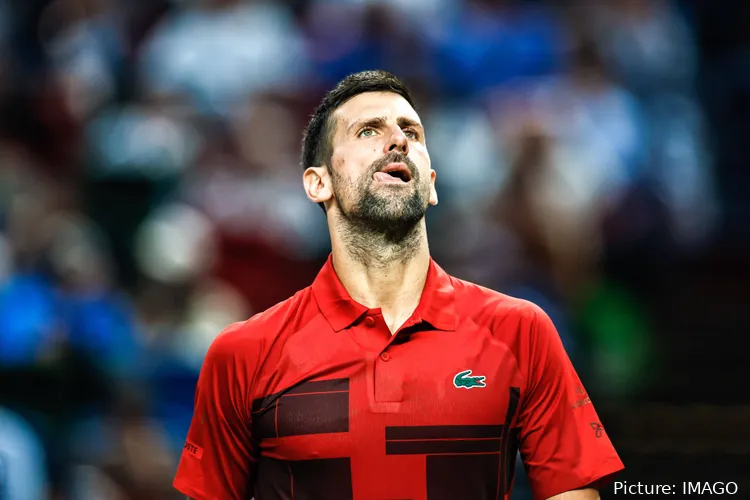
Serbia’s legendary tennis star Novak Djokovic has recently shared insights into how his long-standing rivalry with Switzerland’s Roger Federer and Spain’s Rafael Nadal has profoundly influenced his development as a player. At 37 years old, Djokovic is widely regarded as one of the greatest players in the history of men’s tennis, boasting an impressive record of 24 Grand Slam titles. His career achievements place him among the all-time greats, and his journey through the world of tennis is a testament to resilience, hard work, and continuous improvement.
Over the years, Djokovic’s primary competitors have been Federer and Nadal, collectively known as the ‘Big Three.’ This trio has dominated men’s tennis for nearly two decades, shaping the landscape of the sport and pushing each other to new heights. Each player has his unique style, yet their shared passion for tennis and fierce competitiveness has resulted in some of the most thrilling matches in tennis history.
Federer, often lauded for his grace and finesse on the court, retired from professional tennis in September 2020, ending his illustrious career with 20 Grand Slam titles. His impact on the game extends beyond statistics, as he has inspired countless fans and aspiring players with his sportsmanship and style. Nadal, on the other hand, has announced that he will retire from professional tennis after the upcoming Davis Cup, capping off a career that includes 22 major titles. Nadal’s relentless determination and fighting spirit have made him a fan favorite and a formidable opponent, particularly on clay courts.
In a recent interview with *La Nacion*, Djokovic delved into the competitive dynamics of his rivalry with Federer and Nadal. He specifically addressed the challenging three-year period between his first and second Grand Slam titles, which he credits with being pivotal in shaping his career. “It took me three years to win my second Grand Slam, and I was No. 3 in the world for those three years,” Djokovic revealed. This period was marked by intense competition and personal growth as he struggled to break through against two of the sport’s all-time greats.
During this time, Djokovic faced a series of heart-wrenching defeats that taught him invaluable lessons. “I was also No. 2 in 2009 and was playing at a very high level, but I couldn’t win Grand Slams because of those two. They dominated everything,” he admitted. His inability to secure victories against Federer and Nadal in crucial matches forced him to reassess his approach and strategy. “I didn’t have the formula to beat them. I was able to win one or two matches against them, but not the important ones.”
These struggles, however, proved to be critical for Djokovic’s development as a player. Instead of becoming discouraged, he used the challenges he faced to fuel his ambition. “Those three years were crucial for my development,” he noted. “They made me hungrier to win, especially against them.” This relentless pursuit of improvement became a hallmark of Djokovic’s career, driving him to refine his game and mental resilience.
A significant aspect of Djokovic’s evolution during this period was his understanding of the mental game. He recognized that achieving success at the highest level required not only physical skill but also psychological fortitude. “I knew that if I could find a way to be like those guys in the big matches, and I knew a lot of that came from here (mind), I could somehow figure out the Grand Slams and start winning more,” Djokovic explained. This introspection allowed him to develop a winning mindset, which ultimately led to his breakthrough.
Djokovic’s persistence paid off when he finally captured his second Grand Slam title at the 2011 Australian Open, defeating Nadal in an epic final that showcased his newfound confidence and skill. This victory marked a turning point in his career, setting the stage for a series of unprecedented achievements, including multiple Grand Slam victories and a stint as the world’s top-ranked player.
The mutual respect among the ‘Big Three’ is noteworthy, as they have each acknowledged the contributions of the others to their success. The intensity of their rivalry has fostered a sense of camaraderie and admiration, further enriching the narrative of men’s tennis. Djokovic, Federer, and Nadal have not only pushed each other to excel but have also collectively elevated the sport, captivating audiences worldwide.
As Djokovic continues to compete at an elite level, he remains appreciative of the influence Federer and Nadal have had on his career. Their rivalry has not only shaped his playing style but has also instilled a deep sense of determination to overcome obstacles and seize opportunities. The journey of these three athletes has been closely watched by fans, and as they approach the twilight of their careers, the anticipation of their future interactions and potential matches remains high.
In conclusion, Novak Djokovic’s reflections on his career highlight the profound impact of rivalry in sports. The challenges he faced against Roger Federer and Rafael Nadal served as critical catalysts for his growth, shaping him into the player he is today. Djokovic’s journey underscores the importance of perseverance, mental resilience, and continuous improvement, offering valuable lessons for aspiring athletes in all sports. As he looks ahead, Djokovic is not only focused on further enhancing his own legacy but also on contributing to the ongoing evolution of tennis, a sport that has been forever changed by the incredible journeys of the ‘Big Three.’
Leave a Reply